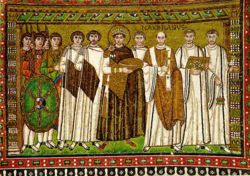Justinian
 From Conservapedia
From Conservapedia 
Justinian I (full name: Imperator Caesar Flavius Petrus Sabbatius Justinianus Augustus) (ca. 482-565) was an emperor of the Eastern Roman (or Byzantine) Empire, considered by modern scholars to have overseen the most brilliant of its periods. He ruled from April 527 until his death 38 years later. Justinian was preceded by his uncle Justin I and succeeded by Justin II. He was the husband of the famous Empress Theodora, a strong woman, who preceded him in death (548).
He is best known for his military successes under his brilliant generals Belisarius and later Narses as he regained almost all of the territory of the old Roman Empire through his conquests in Africa, Italy, and even into Spain. Indeed, Justinian dreamed of reuniting the western Roman empire with the East and once again living the splendor of what Rome once was. (The traditional fall of Rome in 476 was not the definitive landmark that we give it today. Some people, such as Justinian, still felt that the whole Roman Empire was alive, but the west was under temporary occupation until it could once again be freed.)
Between the vastness of his empire in the east and the west, Justinian was almost constantly at war, whether he wished to be or not. His combination of military operations and fort building along with extreme civilian building programs left the one lavish empire on the bring of financial ruin, even as it reached its greatest height and literature flourished. He also is famous for the writing of Justinian's Code, the law code that is the basis of modern law.
Born of peasant birth and scarred by an early attempt to overthrow him in the infancy of his reign, even as Justinian was building the largest empire in Byzantine history, he never felt secure. Nowhere was this more evident than in his relationship with his loyal general, Belisarius. A military genius who was constantly given inadequate forces on his campaigns, Belisarius still managed to achieve startling victories, only to be recalled by Justinian who never took the field himself. When the situation would get desperate Justinian would call upon his famous general, who would once again put things in order, and then be recalled again. Near the end of this life Justinian even had Belisarius imprisoned, but did release him when he thought better of it. When Belisarius died, loyal to the end, Justinian died a few months afterward.
Justinian's conquests were lost shortly after his death, with Italy falling as early as 568 A.D. Distraught after years of armies scouring the land, the people of Italy had no love of the Byzantines and their dream of a reunited empire and were just as thankful to be free of their influence. Later rulers generally were content to recognize that the western empire was no more, and sought secure defensive borders more than offensive actions to take more land that came at great economic cost.
Justinian is a saint of the Eastern Orthodox Church. He was a Christian emperor who feared the effects on his empire from different religious and philosophical viewpoints. To this end he wanted a united Christian view to serve as the backbone of the people and the empire. Pagan and non-Christian thought was suppressed. Justinian even backed the orthodox clergy in denouncing other Christians as heretics. He oversaw the construction of the Hagia Sophia church in Constaninople, which was one of the most magnificent and beautiful buildings ever, until the Muslims turned it into a mosque when they conquered Constantinople in 1453, almost 1000 years after his birth.
In Dante's Paradiso, Justinian appears in the Heaven of Mercury. He explains two theological points regarding justice, reflecting his status in Medieval thought as the archetypal just emperor.
Secret History[edit]
Justinian, Theodora, and Belisarius all figure into Procopius' Secret History, a book which gives a much different view of them than the traditional one.
References[edit]
- Procopius of Caesarea, The History of the Wars
- Holmes, George. The Oxford History of Medieval Europe. Oxford: University Press, 1988.
Links[edit]
Text of Procopius' Secret History
roman-emperors.org
| ||||||||||||||
Categories: [Medieval History] [Byzantine Emperors]
↧ Download as ZWI file | Last modified: 02/26/2023 13:14:30 | 18 views
☰ Source: https://www.conservapedia.com/Justinian | License: CC BY-SA 3.0
 ZWI signed:
ZWI signed: KSF
KSF